When the world's greatest power sets out to conquer a small country, there can be only one result. This time, the British expected an easy and quick victory. Their opponent, however, turned out to be unexpectedly effective. It was close and London would have to fall back on cancer.
In 1877, Great Britain annexed the Transvaal Republic. It was one of the countries founded by the Boers - descendants of the Dutch settlers who came to southern Africa from the end of the 17th century.
Along with the new territory, the British also took over numerous border disputes. The most serious one was with the Zulus, who in the 1820s created a strong state. The collapse of his military power and the successful settlement of border conflicts would ensure the sympathy of the Boer people towards the British authorities. It would also create a strong, consolidated colony in South Africa.
Although it would seem that the war with the Zulus was in the interests of the British government, the conflict did not arise on its initiative. London had much more serious concerns then. For a year he has been involved in the conflict in Afghanistan, which is key to rivalry with Russia for domination in Central Asia. Also the Zulu king, Cetshwayo, did his best not to give the British a reason to war. He knew there could be only one result .
The local governor, Sir Henry Bartle Frere, was pushing for a confrontation. He thought it would be a quick and easy war. He hoped that the victory would give him fame and help in his further career. He was helped by the preliminary findings of the commission appointed to settle border disputes. They mostly agreed with the Zulus, which posed a risk of uneasiness on the part of the Boers.
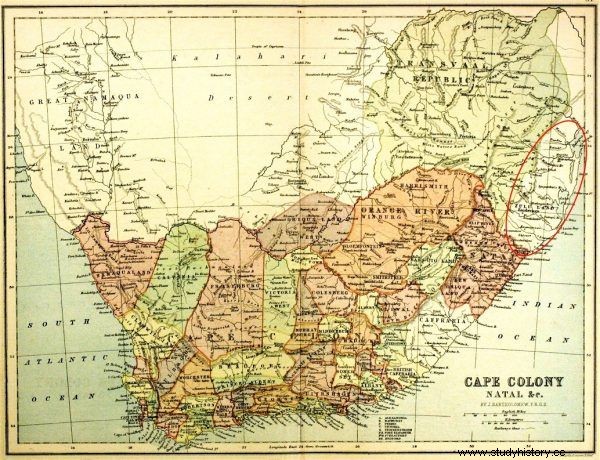
The Zulu kingdom on the map from 1876.
London appealed to Frer to avoid war. Due to the long distance, the capital did not have any real influence on the activities of local administration. Three border incidents served as a pretext to provoke a conflict. Despite the king's apologies and damages, Frere issued an ultimatum containing unacceptable conditions. One of them was the demand to disband the Zulu army! When, as predicted, the dictate went unanswered, the British launched an invasion.
An underrated opponent
The operation was commanded by Lord Chelmsford. He headed a column of over 4,000 soldiers, including 1,200 regular British infantry, supported by the troops of local tribes and Boer volunteers. The general did not hold a high opinion of the Zulus. As early as July 1878, he wrote:"If I am called to conduct operations against them, I will try to show them how hopelessly weaker they are than we are in terms of combat strength although numerically stronger ".
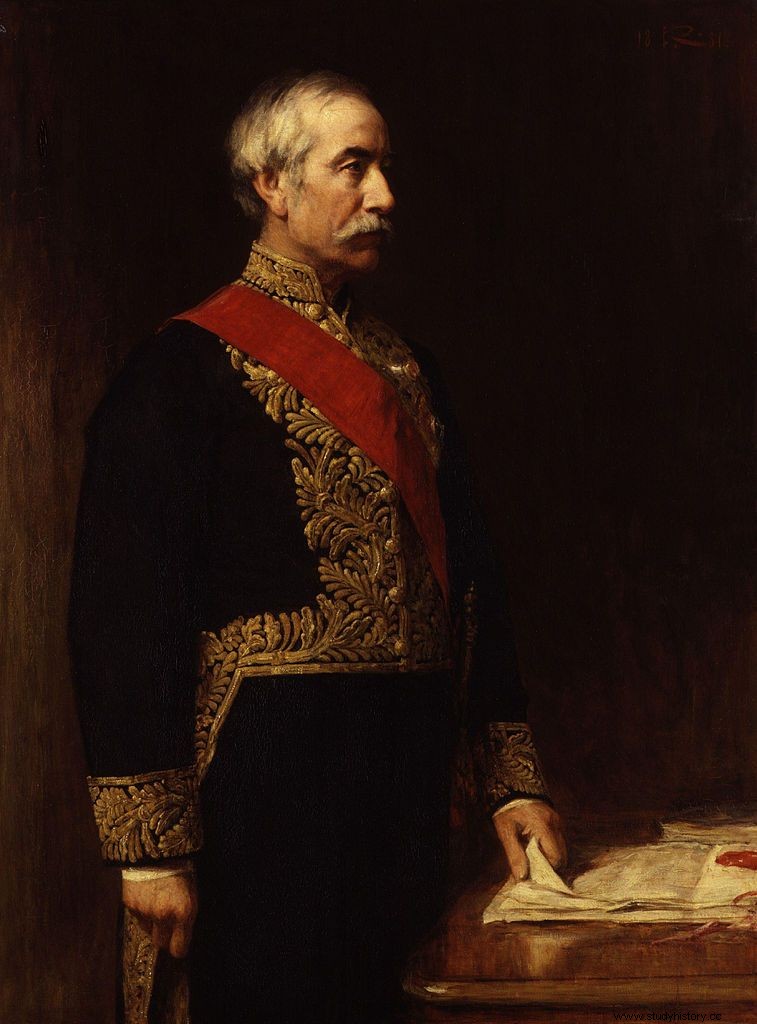
Governor Henry Bartle Frere sought to confront the Zulus.
The disrespectful attitude translated into his actions. When the troop arrived at Isandlwana Hill, where the first battle between British and Zulu forces took place, Chelmsford did not even order the camp to be fortified with a circle of carts. " It would take a week "- he decided. He also neglected adequate reconnaissance, which led him to consider a small group of Zulus as the main force. He followed her with most of the army, unaware that he was falling straight into a trap that had been prepared for himself.
As it turned out, the British allowed themselves to be lured by a subversive detachment that was sent to divide their forces. At that time, the army of 15,000 men, led by the king's brother, was approaching the camp. Only about 1,800 people defended it. Only half of them belonged to the regular infantry, known as "red jackets" due to the color of their uniforms.
It was the morning of January 22, 1879. The soldiers staying in the camp, seeing the enemy troops circling around, finally realized that they were surrounded. Still, they were counting on the Zulu not dare to attack openly.
This is how the defenders' moods were described by one of the officers participating in the clash:
At that time, around 11am, it was believed that the enemy was not going to advance during the day, but an attack at night could be expected. No one had any idea about the possible strength of the enemy's army.
Although there was doubt about the attack, a message was sent to Chelmsford asking for reinforcements. This one, however, ignored them as unbelievable. He even returned an officer who wanted to support the Isaldwana camp on his own initiative.
Main column destroyed
The situation of the British was aggravated by a dispute between the commanders. Colonel Anthony Durnford took a cavalry and a missile battery and set out in search of the Zulu army. Meanwhile, the infantry, supported only by two cannons, remained in place. Lieutenant Colonel Henry Pulleine, justifying his decision, referred to the ban on leaving her from the camp, allegedly issued by Chelmsford himself.
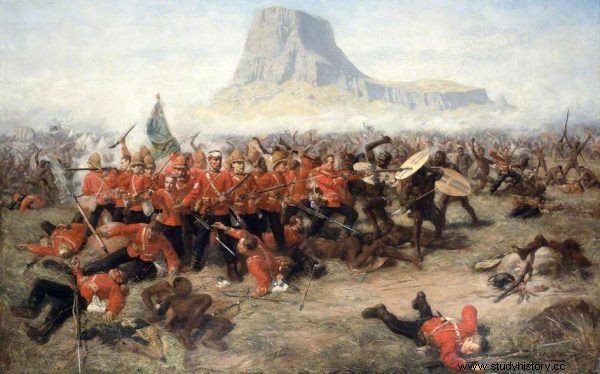
Battle of Isandlwan in the painting by Charles Edwin Fripp.
Pulleine, on whom the brunt of the surprise attack fell, had no military experience. Instead of concentrating the troops in a tight formation with high firepower, he stretched them in a long line of just two lines. The British also stood quite far from the camp, which made it difficult to deliver ammunition. The Zulus, on the other hand, used their traditional "buffalo tactics." While the "head" was binding the opponent with a fight, the "horns" flanked him, cutting off the escape route . This is how one of the officers described the fight:
The Zulu surrounded the camp, engaging the entire army in hand-to-hand combat, destroyed the guns and started a general massacre. About an hour passed from the moment the first infantry unit left the camp to the end of the fight.
The defeat of the British was complete. About 1,300 soldiers were lost. Only the cavalry survived. This practically prevented them from further action. Not only that:taking advantage of his victory, the brother of the king, in command of the Zulu army, moved to the territory of the Transvaal. Thus, he broke the ban issued by Cetshwayo. With a force of 4-5,000 men, he attacked a small mission at Rocke's Drift that was defended by some 100 British.
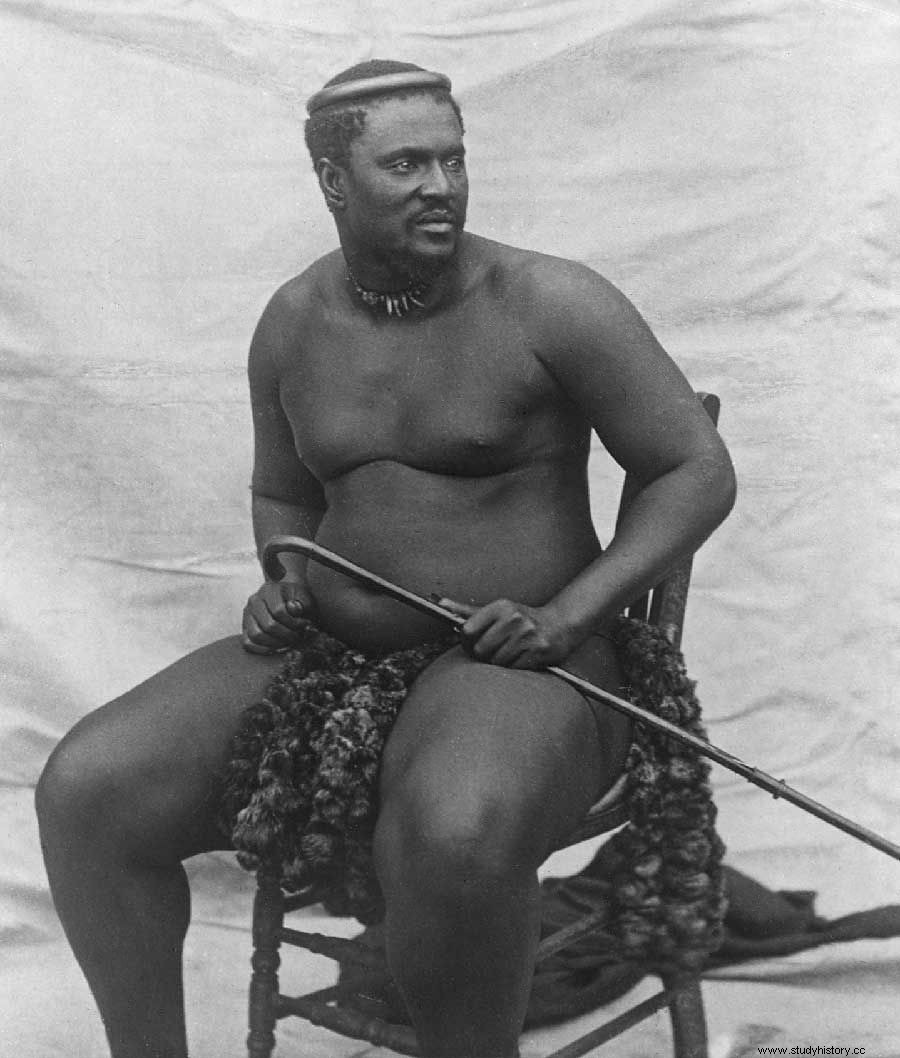
Zulu King Cetshwayo pictured around 1875.
This time, however, it was the Zulu who miscalculated. The defenders, warned by the refugees from Isandlwana, strengthened their positions and repelled the attack for many hours. The Zulu had to withdraw, especially since news had come of the main British forces approaching. Upon his arrival, General Chelmsford decided to fortify himself at Rocke's Drift and wait for reinforcements.
Disaster after disaster
Two other British columns also encountered serious difficulties in the territory of Zululand. One was surrounded by overwhelming Zulu forces upon reaching the Eshowe mission. The natives, learning from the experience of the Rocke's Drift, did not try to attack the fortified positions of the invaders this time. They limited themselves to blocking them effectively. The British could not move, and soon - as if that were not enough - a plague broke out in their camp.
The real massacre took place on March 12 on the Intombe River. As many as 80 people died from the approximately one hundred British unit . This encounter was not of great military importance, but had a strong psychological effect, further weakening the morale of the Crown soldiers.
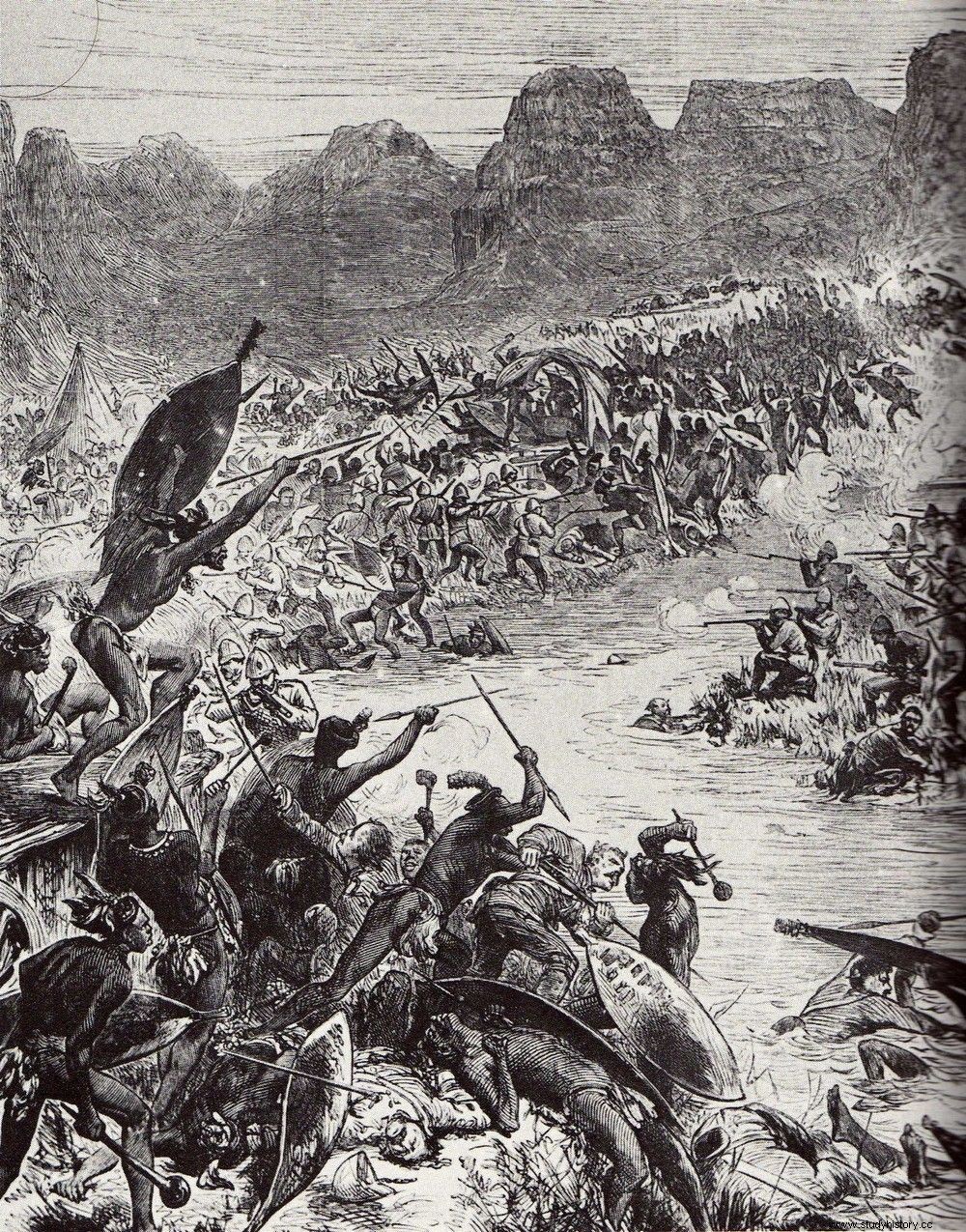
Clash on the Intombe River in period graphics.
This is how the battle was described by Major Tucker, who came to the rescue of the escaping remnants:
Some soldiers slept in tents, others under carts, but before taking up their positions the Zulus fired a volley, then dropped their shotguns ... and almost immediately they were around the carts, at them, and even inside the cattle pen. They came so fast that there was hardly any defense from our soldiers - each fighting for their own lives. It was all over in minutes and ours were simply slaughtered.
The third invasion column met a much better fate. On March 28, it occupied two plateaus near the village of Hlobane. The British wanted to force the Zulu to attack their fortified positions. However, when they noticed that the main Zulu forces were approaching their camp, they were unable to organize an effective defense. Once again, chaos reigned in the ranks as a result of the lack of coordination between commanders.
The cavalry was left behind without infantry support. She could only withdraw through the so-called Devil's Pass. It was an extremely difficult terrain for the riders. The Zulu pedestrians moved faster, so they easily caught up with them and inflicted heavy losses. About 100 British and twice as many auxiliary troops died.
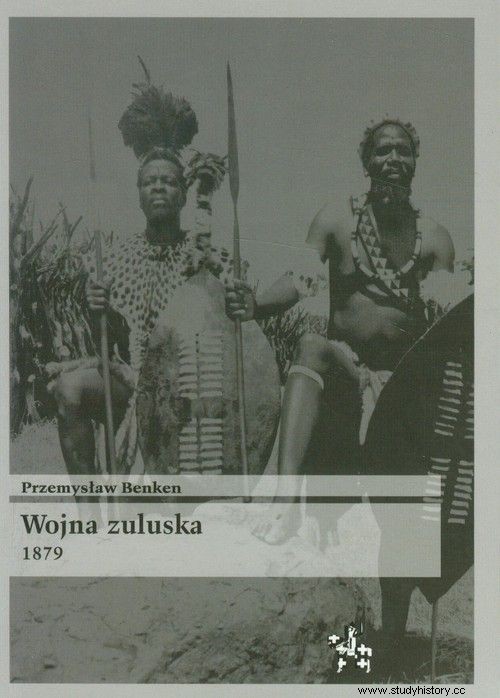
The article was based, inter alia, on the book by Przemysław Benken entitled "Wojna zuluska 1879" (Inforteditions 2012).
The empire strikes back
The victories of Cetshwayo's army did not last long, however. The next day, March 29, 1879, the Zulu attacked the British camp near Kambula. They were ten times outnumbered ... but still defeated. They were driven out and lost about 1,000 people. Even the use of modern rifles captured at Isandlwana did not help the warriors.
Meanwhile, Chelmsford moved to the rescue for Eshowe. On April 2, after the victorious battle of Gingindlov, he managed to break the siege. The scales of victory began to tip in favor of the British. From the very beginning, the losses for the defenders of Zululand were much greater.
The Zulu have already lost over 5,000 warriors. Probably twice as many injured. African shamans experienced in treating injuries inflicted with traditional weapons were helpless against rifle bullets that stabbed deeply into the body and caused internal bleeding.
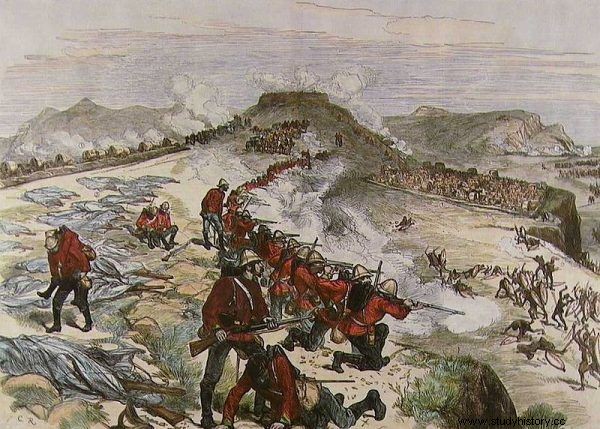
The Battle of Kambula in a drawing by Melton Prior.
King Cetshwayo hoped that a blow to the enemy in the initial phase and delaying the attack would make the British consider the cost of the war too high. He hoped the invaders would start peace negotiations. However, the opposite happened. The humiliation caused London to send in massive reinforcements . At the beginning of June 1879, another invasion began, also in three columns. The Zulus made attempts to negotiate, but the British were not interested in them. The purpose of the war was to break the power of a small state.
The Zulu set up numerous ambushes against the marching British. In one of them even the son of Napoleon III died, who fled with his father to England after the fall of the Empire and joined the army there. This could not, however, change the fate of the war. On July 4, Imperial troops captured the Zulu capital, Ulundia. Zululand was split into 13 parts and became totally dependent on Great Britain.
